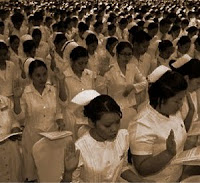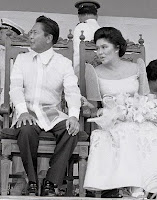ABS-CBN reports on Boracay debauchery, dabbles in the sexploitation sex scandal genre
 Oh the horrors! People caught making out and having sex on the beaches of Boracay! ABS-CBN News for the first time beat the Catholic Bishops in the game of huffing and puffing about sin and scandal in its "exclusive" report on Boracay beach debauchery caught on video. Star of 1996 sexploitation film Ang pinakamagandang hayop sa balat ng lupa Ruffa Gutierrez also chimed in...
Oh the horrors! People caught making out and having sex on the beaches of Boracay! ABS-CBN News for the first time beat the Catholic Bishops in the game of huffing and puffing about sin and scandal in its "exclusive" report on Boracay beach debauchery caught on video. Star of 1996 sexploitation film Ang pinakamagandang hayop sa balat ng lupa Ruffa Gutierrez also chimed in..."Bilang Pinay I'm still very conservative, ayaw ko naman gawin ng mga anak ko yun one day...for me that's just not right [...]"
Quite an ironic position to take, considering that Gutierrez appears half-naked in most of the scenes in which she appears in that 1996 movie which, by the way, is set -- where else -- on the beach!
But the real question one might think of asking the producers of ABS-CBN is this:
What were a bunch of people doing sneaking around in the dark pointing video cameras at people to begin with?
Obviously, ABS-CBN is not above a bit of sexploitation itself, splashing these "scandal" videos (a genre of film making Filipinos are renowned for) all over its network of media outlets in the guise of it being a "news report". Moreover, it makes use of a rather sneaky literary device -- juxtaposing morality mongering with its sex-charged content.
This is a feature of the Filipino character which I highlight in my book, specifically in this excerpt:
In her article "Between Sensationalism and Censure" (Philippine Journalism Review, April 2002, pages 35-37), Diana Mendoza observed how the bizarreness of Filipinos' regard for sexuality is reflected in Philippine cinema. Her observations are gleaned from among others, comments made by sociology professor Michael Tan of the University of the Philippines in the Sixth International congress on AIDS in Asia and the Pacific held in Melbourne, Australia from the 5th to the 10th October 2001:Commenting if the Philippines could be at the forefront of education on sex and sexuality Tan said no, because "media have very sensational coverage but they still have this patina of moralism which is strange." He said this brims over to the film industry that churns out movies carrying the "crime and punishment" theme -- for instance, movies with pots of adultery that run steamy sex scenes but which towards the end, mandate that the adulterer, who is always the female, gets shot or imprisoned.
"With these endings, movies become a morality play after two hours of titillation," he said.
Furthermore:Tan said Filipino movies also carry the "crime and redemption" theme, in which a sex worker eventually realizes there is a better life outside prostitution, but only after the audience [have] been treated to several sexual episodes.
More disturbing than simply being uncomfortable is how inconsistent and misguided Filipino responses to issues of sexuality can get. The Filipino Male enjoys the better half of a double standard that prevails in Philippine society. And this is what contributes much to the bizarreness of Filipinos' regard for sex.
Ain't Filipinos such class acts? Even in the act of high-nosed moralising, we still come across as the ethically-disturbed primitivist people that we are.




How classy of ABS-CBN. I watched TV Patrol myself yesterday and I was shaking my head (like I always do when I watch their reports). I can't imagine Al Jazeera or NHK evening news to give that sort of news (how is that a "news" by the way!) a portion of their airtime.
ReplyDeleteWell anyway, ABS-CBN is a profit-oriented organization that airs what their audience demands. And that audience happens to be the Filipinos. Says a lot about us.
The Filipino Male enjoys the better half of a double standard that prevails in Philippine society. And this is what contributes much to the bizarreness of Filipinos' regard for sex.
ReplyDeleteWhat particularly aggravates me about Filipino society is how we can claim to be 'emancipated,' particularly when it comes to gays.
I do not consider myself straight and I think people like Vice Ganda and John Lapus are really only promoting stereotypes. It's as if somehow being gay means you've been rejected from our macho society because you can't be a womanizer (as exemplified in our current youth in the jejemon, all gangsta 'n shit.)
@ Anonymous: With ABS-CBN, before you can even get your head around evaluating the content of their programs, you need to get past their garish manner of presentation first -- all those bells and whistles and fancy jeepney-like colour and graphics splashed all over the screen is quite an assault on reasonable taste. Compare the news programs of ABS-CBN with other news programs around the world and you will see the stark contrast between the whimsically-sensationalist shout-out style of ABS-CBN and the serious, sober, and considerate manner of the other programs.
ReplyDelete@ The Lazzo: That's because Filipinos have a one-dimensional regard for malehood and this is reflected in the behaviour and demeanour of the most powerful men in our society -- most evident, particularly, in how they get away with banal impropriety and even the most heinous of crimes. That is why I find myself being merely bemused by all this "indignation" being displayed in our society against "corruption" and "injustice". Filipinos -- particularly our males -- are raised to be corrupt and unjust from childhood. What we see as corruption and injustice in politics and governance are merely superficial manifestations of a more deeply-entrenched inherent character of corruption and injustice in the bottom-most underbelly of the Filipino psyche.
Unless that deeply-entrenched inherent character of the Pinoy that predisposes him/her to engage in (when in power) and tolerate (when not in power) corruption and injustice, all this posturing, grandstanding, and platitude-brokering in the name of "justice" and "transparency" we see in the way Media reports Philippine "politics" comes across to the more insightful of our lot as no more than a circus to amuse ourselves with.
I remember watching this yesterday with my lola and heard her say "Ngayon nyo lang nalaman yan?" refering to abs-cbn. Its a vacation spot; what do you think couples are doing there? Playing chess? I don't get the big deal besides the couple violating public indecency laws. why report it on the evening news anyway?
ReplyDelete"The Filipino Male enjoys the better half of a double standard that prevails in Philippine society."
This is one reason our entertainment industry (and our culture) never matures.
Yes, people making out and even having sex on the beach shouldn't be a big deal. But apparently it is in societies populated by people who cannot mind their own business.
ReplyDeleteDon't we have more pressing national issues than sex on the beach? How about the fragile ecology of Boracay? I'm glad I don't watch much from local networks in general - and doubly glad I don't watch anything from the government channel Abs-Cbn!
ReplyDeleteJesucristo, those bozos must have taken "Sex on the Beach" quite literally.
ReplyDeleteBlame the movie From Here to Eternity... ;-)
ReplyDeleteThanks for this. My comments are maybe a little late, but yeah, there are more important national issues that this one. Good to know and need to know issues should always be handled well especially if they are given out by media.
ReplyDeleteAnd oh! by the way, Professor Tan is an anthropology professor not a sociology prof. Just an info. Thank you. :D
Awesome blog you haave here
ReplyDelete